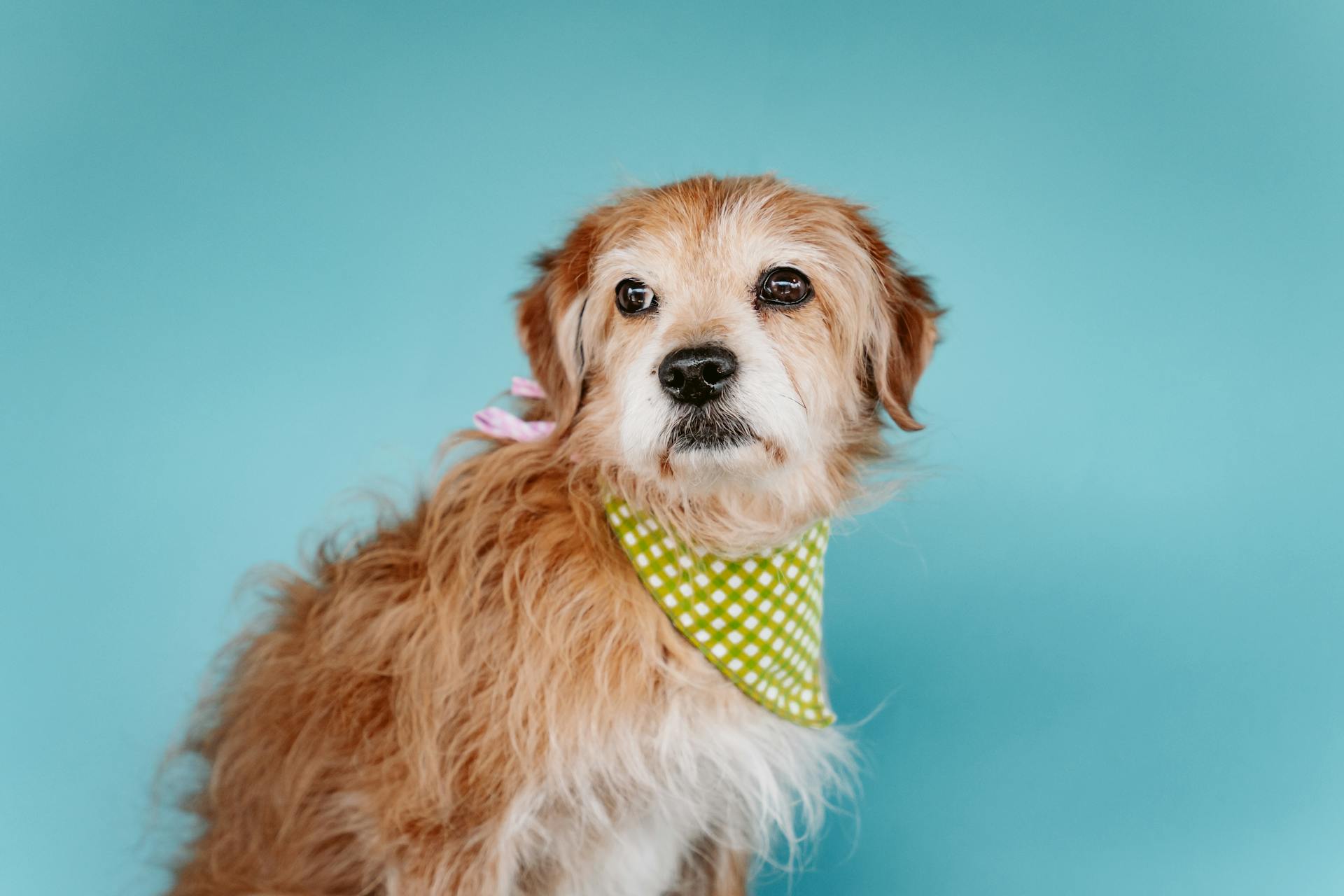
The Bakharwal dog is an ancient breed native to the Indian subcontinent, specifically the Himalayan region. They were originally bred to guard livestock and protect their owners from predators.
These dogs are highly skilled at detecting and tracking threats, thanks to their keen senses and strong instincts. They're often referred to as "mountain dogs" due to their rugged terrain origins.
Their thick coats and sturdy builds enable them to thrive in harsh, cold environments. In fact, they're often seen patrolling the high-altitude pastures of the Himalayas.
Bakharwal dogs are generally friendly and affectionate with their families, but can be wary of strangers. This makes them excellent watchdogs, always keeping a watchful eye on their surroundings.
Physical Characteristics
The Bakharwal dog is a sturdy breed with a majestic look, thanks to its furry coat and plumy tail.
They come in a variety of colors, including black and tan, red, fawn, pied, sable, white, and brindle.
The average body height of a mature Bakharwal dog is between 24 and 30 inches at the withers.
Their weight range is between 38 and 59 kg, with some sources citing a slightly broader range of 36-59 kg.
Here's a summary of the Bakharwal dog's physical characteristics:
The Bakharwal dog's lifespan is between 10 and 12 years, making them a long-term companion.
Their diet consists mainly of bread made from rice chaff, maize, and milk, although some nomads claim they can also thrive on meat.
Temperament and Behavior
The Bakharwal dog is a loyal and protective breed, known for its strong guarding instincts. They are naturally independent and will stand by their masters, protecting them and their families from any perceived threats.
Bakharwal dogs are generally tolerant of people, especially within their family, but can be aggressively territorial towards other animals, particularly other dogs. This can make socialization with other dogs challenging.
One of the unique characteristics of the Bakharwal breed is their strong attachment to their family members. They consider their family kids as part of their herd and will protect them with great commitment.
Suggestion: Strongest Dog Names
However, their strong guarding instincts can sometimes make them wary of strangers, and they may require time to warm up to new people.
Here are some key personality traits to consider:
Overall, the Bakharwal dog is a unique breed that requires patience, consistency, and positive reinforcement training. With the right approach, they can thrive as loyal and loving companions.
Health and Care
The Bakharwal dog is generally a healthy breed, but like all dogs, they can be prone to certain health conditions. Hip dysplasia, bloating, patellar luxation, obesity, and cryptorchidism are common health issues that can affect them.
Regular veterinary check-ups are essential to catch any potential health problems early on. The Bakharwal dog should have a complete physical check-up at least every 12-18 months, but preferably once a year.
A balanced diet and regular exercise can help prevent obesity and other health issues. Feed your Bakharwal dog 2.5 to 4 cups of high-quality dry food a day, divided into two meals, and make sure they get daily walks.
Here are some common health issues that can affect Bakharwal dogs:
- Hip dysplasia
- Bloat
- Patellar luxation
- Cryptorchidism
- Obesity
With proper care and attention, Bakharwal dogs can live a long and healthy life, with an average lifespan of 10-12 years.
Why Are Species Becoming Extinct
Species are becoming extinct due to a combination of social and biological factors. One such example is the Bakharwal Dogs, which are struggling to survive in the harsh weather conditions of their native region.
Their decline can be attributed to the native tribes giving up their nomadic lifestyle, making the dogs detached from human company. This lack of interaction has likely contributed to their extinction risk.
In addition, the Bakharwal Dogs have been used in historic rebellions, where many were killed by opponents, further decreasing their numbers.
The breed's small litter size, with females producing only 1 to 3 puppies per year, is another significant factor contributing to their decline.
The intensity of deadly diseases like rabies has also taken a toll on the Bakharwal population.
Here are some key factors contributing to species extinction:
- Nomadic lifestyle changes
- Historic conflicts
- Small litter sizes
- Deadly diseases
Health and Lifespan
The Bakharwal dogs are generally healthy, but like all breeds, they can be prone to certain health issues. Their common health problems include hip dysplasia, bloating, patellar luxation, obesity, and cryptorchidism.
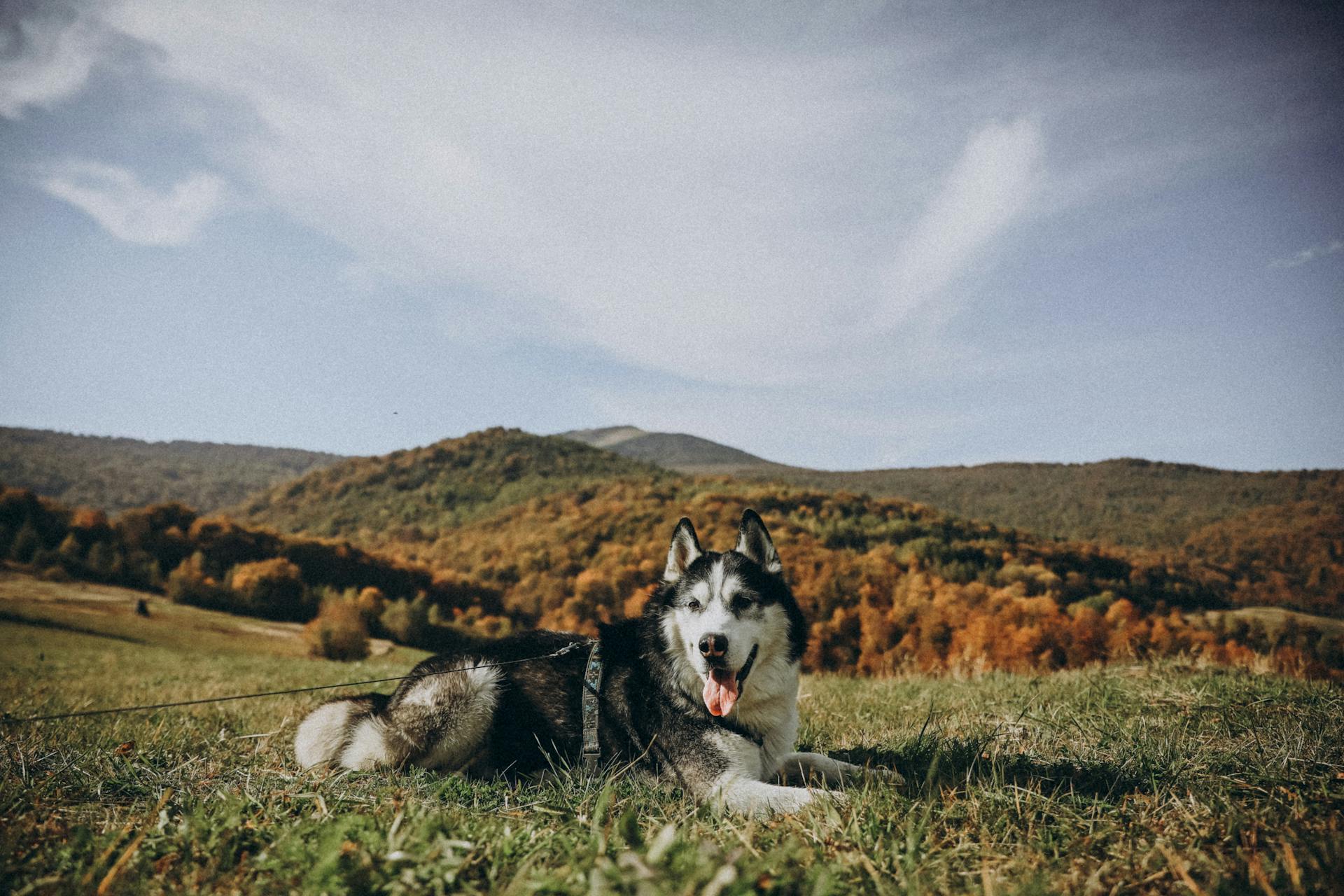
Their immune system is strong, but they can still suffer from work-related injuries. As a big dog breed, they're more likely to experience certain ailments.
Bakharwal dogs have an average lifespan of 10 to 12 years, which is a relatively long life for a large breed.
Here are some common health issues that can affect a Bakharwal dog:
- Bloat
- Obesity
- Hip dysplasia
- Cryptorchidism
- Patellar luxation
To keep your Bakharwal dog healthy, make sure to feed them high-quality dry food and provide regular exercise. Aim for 2.5 to 4 cups of food per day, divided into two meals. Regular walks and playtime can help prevent obesity and other health issues.
A complete physical check-up every 12-18 months (or once a year) is recommended to keep your Bakharwal dog in top shape. If you notice any symptoms or weight gain, consult your veterinarian for a diet plan and advice on reducing unhealthy food and snacks.
You might like: Why Does My Male Dog Keep Licking My Female Dog
Reproducibility
A Bakharwal Dog is pregnant for about 60-64 days, which is a relatively short gestation period compared to other breeds. This means you should be prepared for the arrival of your new puppies in about two months.
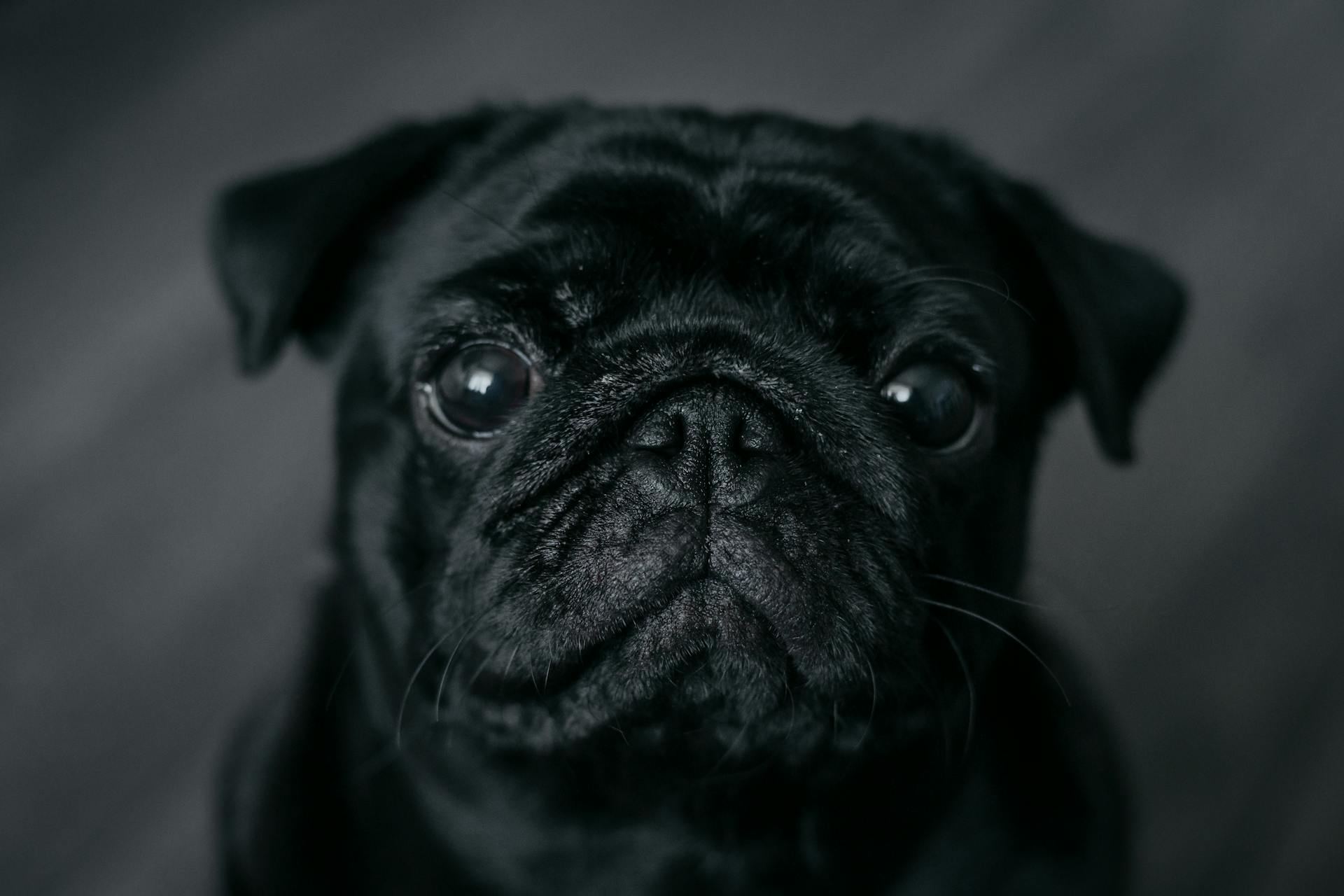
A typical litter size for a Bakharwal Dog is between 1-3 puppies, which is a manageable number for a first-time dog owner. This also means you'll have more time to devote to each puppy and ensure they receive the care and attention they need.
The reproductive cycle of a female Bakharwal Dog is divided into four stages: Proestrus, Estrus, Diestrus, and Anestrus. The Proestrus stage lasts for about 9 days and is characterized by a swollen vulva and bloody discharge.
Here's a breakdown of the reproductive cycle:
It's essential to remember that a Bakharwal Dog can only have puppies once a year, and more frequent breeding is not healthy. This means you should plan for a single litter per year and ensure the mother is given enough time to rest and recover.
Training and Socialization
Training your Bakharwal dog requires patience and consistency. They can be stubborn at times, but with positive reinforcement, they'll learn quickly.
To start, ignore your puppy when it whines or whimpers, as this can create a habit of demanding attention. Instead, reward it with a treat or pat when it stops whining.
Bakharwal dogs are intelligent, but they can get bored easily, leading to destructive behavior. Keep them engaged with fun games and puzzles that challenge their minds.
Consistency is key when training your Bakharwal dog. They understand and remember new commands after an average of 25-40 repetitions. Be patient and reward their efforts.
Bakharwal dogs are naturally protective of their territory and make excellent watchdogs. They're very territorial and will alert you if they sense something unusual.
Here's a summary of training tips for your Bakharwal dog:
- Ignore whining or whimpering to prevent creating a habit
- Keep them engaged with fun games and puzzles
- Be patient and consistent in training
- Reward their efforts with treats and praise
Practical Considerations
The Bakharwal dog is a robust breed that requires regular exercise to stay healthy and happy. They need at least 30 minutes of exercise per day.
Their thick coats require regular grooming to prevent matting and tangling. This should be done every 2-3 weeks.
Bakharwal dogs are generally good with children and make excellent family pets, but they do need early socialization to ensure they are well-adjusted and calm in new situations.
Curious to learn more? Check out: What Nutrients Do Dogs Need in Homemade Dog Food
Pros and Cons
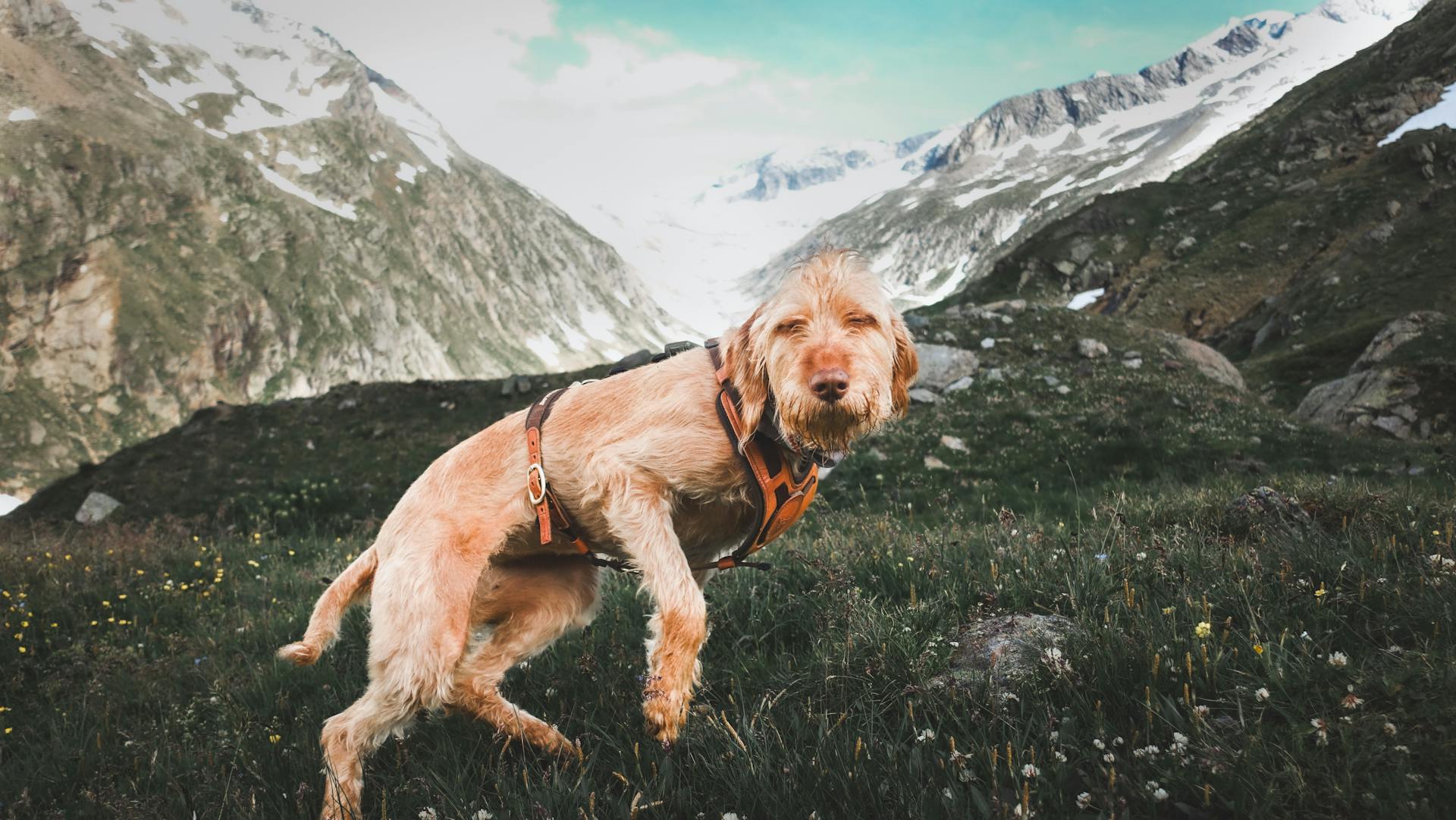
If you're considering bringing a Bakharwal Dog into your life, there are a few things to keep in mind. Bakharwal Dogs are commonly healthy dogs.
One of the biggest advantages of owning a Bakharwal Dog is their excellent watchdog rating - they're one of the best watchdogs you can get. This makes them a great choice for families who want to feel safe and secure.
Bakharwal Dogs are also extremely tolerant of alone time, which means they're happy to entertain themselves while you're away. This can be a huge relief for busy owners.
If you have kids, Bakharwal Dogs are a great choice - they're kid-friendly and love being around people. They're also great with elderly people, making them a fantastic breed for senior citizens.
However, Bakharwal Dogs do have some downsides. They're not apartment-friendly, so if you live in a small space, this might not be the breed for you.
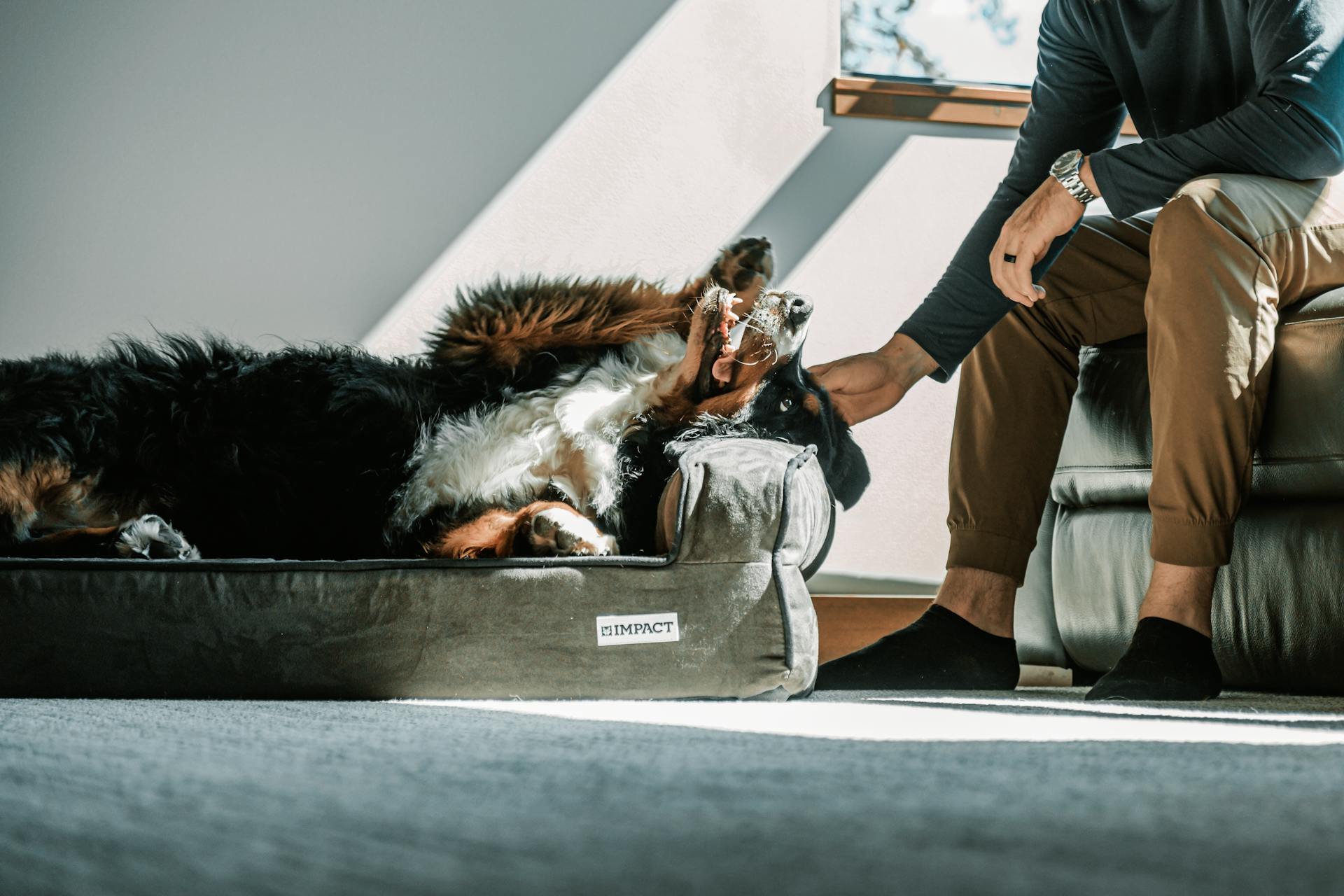
Bakharwal Dogs also require a lot of grooming, which can be time-consuming and expensive. They're not the best choice for people with allergies, as they can cause allergic reactions.
If you're a first-time owner, Bakharwal Dogs are a great choice - their easy-going personality makes them easy to care for. However, they're not the best choice for office environments, and they're not cat-friendly either.
Here's a summary of the pros and cons of owning a Bakharwal Dog:
9 Responses
The Bakharwal Dog is a rare breed that requires attention and care.
Some people are interested in getting a Bakharwal puppy, as seen in the comments section where Arvinder and Vijendra both expressed their desire to have one.
If you're looking to get a Bakharwal puppy, you may want to be prepared for the possibility of finding a breeder or owner who is willing to part with one of their dogs.
A Bakharwal dog owner, Saad Khan, has shared his experience with the breed and highlighted the issue of finding a female dog of the same breed for his dog to mate with.
Here are some numbers to consider if you're trying to contact someone who has a Bakharwal puppy: 9252009007, which is Vijendra's phone number that he left in the comments.
Additional reading: St Bernard Bernese Mountain Dog Puppy
Frequently Asked Questions
What is the quality of Bakharwal Dog?
The Bakharwal Dog is a robust and resilient breed, generally resistant to illness and infection. With proper care, they can live a relatively long and healthy life.
What is the purpose of the Bakharwal dog?
The Bakharwal dog's primary purpose is to protect its flock from predators. As a livestock guardian, it courageously defends its herd against threats.
What is the English name of bakharwal dog?
The English name of the Bakharwal Dog is Bakharwal Dog, Kashmir Sheepdog, or Bakharwal Mastiff.
Featured Images: pexels.com


